|
|
|
Sort Order |
|
|
|
Items / Page
|
|
|
|
|
|
|
| Srl | Item |
| 1 |
ID:
189386
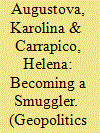

|
|
|
|
|
| Summary/Abstract |
Migrants’ involvement in smuggling increases alongside restricted cross-border movement and violent borders, yet this dynamic is usually examined from migrants’ position as clients. In this article, we move away from migrants and smugglers as two separate roles and question migrants’ aspirations to and experiences of resorting to smuggling networks as workers in the context of EU land borders, where direct violence is used daily to fight cross-border crime. By doing so, we move further the examination of fluid relations in smuggling provisions and the way they are intertwined with care and exploitation, as shaped and circumscribed by violent borders. The article illustrates the intersections between border violence and migrants’ active involvement in smuggling by drawing on the case study of an anonymised Border Town and multi-site, multi-author fieldwork from Serbia and Bosnia. By questioning migrants’ experiences of shifting roles from clients to service providers, and by taking into account their work in smuggling provision, we show that, in a situation of protracted vulnerability orchestrated by border violence, state and law enforcement, the categories – “migrant” and “smugglers” – can blur.
|
|
|
|
|
|
|
|
|
|
|
|
|
|
|
|
| 2 |
ID:
189394
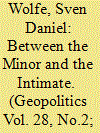

|
|
|
|
|
| Summary/Abstract |
Through an investigation of authoritarian encounters in Russia, Belarus, and Ukraine, this paper takes seriously the challenges of making geopolitical sense of contextualised micro moments. Working in a minor key, the paper offers three contributions. First, it advances a minor theory, micropolitical sensibility that interrogates the co-constitution of intimate and geopolitical scales. Second, it proposes a loose ethnographic framework to guide the analysis of ordinary moments, link them outside of the immediate, and make fuller sense of the geopolitical: rupture, digestion, connection, and representation. Third, it aspires to destabilise regional container thinking and Orientalising tendencies through a focus on authoritarian practices rather than authoritarian states. Overall, the paper foregrounds a minoritarian reading of the micro-dynamics of authoritarian encounter in order to enrich the conversation on the constitution of the geopolitical, while also offering an intimate and interconnected methodology that encourages critical, safe, and ethical research under authoritarian conditions.
|
|
|
|
|
|
|
|
|
|
|
|
|
|
|
|
| 3 |
ID:
189382


|
|
|
|
|
| Summary/Abstract |
For too long anthropocentrism has dominated border studies, which operates within the familiar society-nature duality. A post-humanist approach to borders offers an alternative beyond this dichotomy. It allows for a reconsideration of terrain as a more-than-human assemblage with political agency. Drawing on the central tenets of post-humanist literature in political geography, this article explores the agency of a particular spatiotemporal configuration of terrain, the Rio Bravo/Grande, in bordering and in resistance to bordering. It asks how it is entangled with the United States-Mexico border and other human and non-human objects, actions and actors that make the border, and also how the river affects human bodies and consequently border policies and territory. Drawing on two recent events, it is argued that the river becomes an actor capable of simultaneously impeding migration, and creating emotional ties and resistances. In the discussion of such entanglements, it is concluded that the river affects borders due to the material vulnerability and sensitivity of human bodies.
|
|
|
|
|
|
|
|
|
|
|
|
|
|
|
|
| 4 |
ID:
189381


|
|
|
|
|
| Summary/Abstract |
Airports and seaports inhabit multiple geographies that dictate global mobility across political, economic, social, and environmental borders. In Australia and across the Asia-Pacific, large-scale mobility developments are being undertaken to connect local businesses and industries with global markets. However, these projects are proceeding without regard for the impacts that these mobility hubs will have on local and global ecologies. This is certainly the case across the Asia-Pacific region, where industry is impacting on the routes of migratory shorebirds along the ‘East Asian-Australasian Flyway’, which spans 18 countries and carries over 50 million migratory birds each year. Key sites that make up the Flyway are established and prolific hubs for these nonhuman mobilities, yet encroaching land reclamation practices are resulting in considerable avian population declines. This paper explores how more-than-human conceptualisation of the EAA Flyway and the “borders” it instigates through global conservation and nation-state governance are inadequately protecting the migratory shorebirds. We examine the recent and contested developments in Moreton Bay, in Brisbane, Australia, and the many bordering practices that take shape in this local place along the EAA Flyway. We argue that the multi-sited path that compose these global Flyways challenge our all-too-human-centric conceptions of space, borders, and movement.
|
|
|
|
|
|
|
|
|
|
|
|
|
|
|
|
| 5 |
ID:
189398
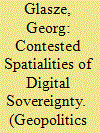

|
|
|
|
|
| Summary/Abstract |
“Digital sovereignty” has become a buzzword in digital policies. Contrary to the imaginary of digital transformation as preceding an era of limitless global networking in the 1990s, approaches to state regulation and delimitation of data flows as well as programmes for national digital infrastructures are justified with calls for digital sovereignty across very different contexts. This forum brings together contributions from political geography, law, computer science, and ethics that compare and analyse discourses and practices of digital sovereignty. The case studies on Russia and the EU reveal parallels as well as fundamental differences in the conception and implementation of digital sovereignty. Essays on the challenges posed by new forms of cross-border interaction (such as cloud computing) and new actors (such as digital platforms) illustrate that the traditional coupling of concepts of sovereignty, territoriality and the state, of jurisdiction and borders, must be rethought. The essays in this forum thus make it clear that the digital transformation is not simply a socio-technical modernisation process. It is rather shaped in specific ways and should be understood and analysed as (geo)-political discourses and practices. The forum contributes to the development of a political digital geography that analyses how the digital transformation is contested and produced in specific ways and unearths the politics and spatialities conceived and produced in these discourses and practices.
|
|
|
|
|
|
|
|
|
|
|
|
|
|
|
|
| 6 |
ID:
189387


|
|
|
|
|
| Summary/Abstract |
Successive migration ‘crises’ in the Mediterranean have led to renewed scrutiny of search-and-rescue (SAR) logics along the southern European border. This article focuses on the Spanish approach to maritime SAR, which has received relatively less attention than the two other approaches present in the region: the militarised approach and the NGO approach. I use administrative data, budgetary information, and qualitative interviews to discuss the evolution of SASEMAR, the civil and public Spanish SAR agency that has traditionally embraced an expansive interpretation of both humanitarianism and Spain’s legal obligations to protect life at sea. I argue that, with the evolution of the southern EU border, SASEMAR has become an obstacle in the harmonisation of SAR approaches in the region – a process defined by the criminalisation of acts of solidarity not carried or sanctioned by the state, the adoption of a minimalistic interpretation of humanitarianism, and the placing of rescue obligations in the hands of militarised agencies. To remove this obstacle, the Spanish government is reclaiming and re-appropriating SASEMAR’s structure using three main strategies: the precarisation of rescue crews, the territorial externalisation of SAR responsibilities to Morocco, and the transfer of SAR decision-making powers to national, supranational, and international agencies with close links to the military.
|
|
|
|
|
|
|
|
|
|
|
|
|
|
|
|
| 7 |
ID:
189390
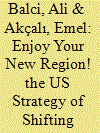

|
|
|
|
|
| Summary/Abstract |
Where does Turkey geographically belong, the Middle East or Eastern Europe? This was a looming puzzle for the architects of the Cold War to solve in the early 1950s. This was so because Turkey’s region would dramatically affect the composition of members in the UN Security Council. Although Turkey was elected to the Council from the Middle East region in 1950, it moved its region to Eastern Europe in 1953 to compete with Poland for the Council seat. However, the determination of where Turkey belonged was not an easy task and demanded very delicate calculations and political strategies. We argue that it was the Cold War strategies of the US that arbitrated where Turkey geographically belonged, exemplifying that regions are formed through discourse and are constantly mediated and renegotiated. This situation has created both opportunities and limitations for the Turkish policy-makers who joined the debate ex post-facto, spoke either to legitimise the US decision or to displace counter arguments.
|
|
|
|
|
|
|
|
|
|
|
|
|
|
|
|
| 8 |
ID:
189392


|
|
|
|
|
| Summary/Abstract |
The objective of this article is to analyse the conceptualisation of space in border studies. My interest in the subject arises because recent articles published on diverse outlets of border studies have advanced the notion that borders are on the move and not necessarily located where it is expected—at the line shared by two sovereign nations. Instead, scholars argued that borders have become dislocated, displaced and can be found in-between, anywhere even if they have been out-sourced or placed off-shore. This notion of borders “everywhere” gives the sensation that borders are becoming a-spatial, a-territorial, space no longer matters, and geography is dead. This paper challenges that view. Thus, the main contribution this paper makes is to bring back space into border theory by tracing and reinserting spatial concepts into the discussion of border studies. The central argument in the paper is that space and borders are closely intertwined—like the ying and yang; borders are space. I argue that we can advance the theorisation of borders from a spatial perspective by delving deeper into concrete spatialisations such as micro spaces or heterotopias (besides the camp. Prison, mental hospitals, etc.) where bordering practices take place.
|
|
|
|
|
|
|
|
|
|
|
|
|
|
|
|
| 9 |
ID:
189393
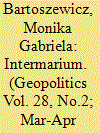

|
|
|
|
|
| Summary/Abstract |
The Three Seas Initiative was launched in 2015 by Croatia and Poland; today, it brings together 12 European states located in the Adriatic, Baltic, and Black Seas basins. To understand the rationale behind this seemingly precarious regional project, this paper employs the optics of critical geopolitics, which shifts the focus away from the exclusive concerns of great powers machinations, counters the dominant narrative by emphasising the multiplicity of voices in the geopolitical spectrum and stresses the emancipatory nature of the whole project balanced by its heterarchical characteristic. This angle allows us to capture the full complexity of this geopolitical design characterised by two phenomena: ‘being in between’ (monolithic powers, areas of domination, or at least domination, one religion and one language) and ‘fragmentation and multinationality’. The analysis demonstrates that Intermarium is an attempt to break away from everything that prevents the region ‘between Berlin and Moscow’ from being a subject, not an object of political affairs, and shows how Central and Eastern Europe fits into the post-liberal international order.
|
|
|
|
|
|
|
|
|
|
|
|
|
|
|
|
| 10 |
ID:
189385


|
|
|
|
|
| Summary/Abstract |
This paper maps out contemporary discourses of Chinese diplomacy that have proliferated under the aegis of ‘major country diplomacy with Chinese characteristics’. We examine how these narratives are underpinned by webs of relationality that see China promoting equal and win–win partnerships with other state actors, yet are also defined by hierarchical premises for such diplomatic engagements. These relational contradictions are most clearly manifested when we interrogate the spatial dynamics of China’s diplomatic endeavours through the Belt and Road Initiative (BRI). By scrutinising the geopolitical imaginations, sites and scales associated with the BRI, we turn attention to three spatial tensions that are closely bounded up with the relational contradictions of Chinese diplomacy: ‘win–win’ diplomacy promoting a ‘harmonious world’ versus territorially based diplomacy; periphery diplomacy versus the global ambitions of BRI; and the centralisation versus decentralisation dimensions of Chinese diplomacy. This allows us to make sense of the multiplicity of descriptors that have been affixed to Chinese diplomacy, in order to underscore the ‘work’ they perform to bequeath (at times, divergent and contested) meanings to China’s new foreign policy approach. Hence, a relational and spatial understanding of Chinese diplomacy, we argue, can reveal a more nuanced picture of the promises, potential and disjunctures of China’s rapidly expanding geopolitical and diplomatic actions on the international stage.
|
|
|
|
|
|
|
|
|
|
|
|
|
|
|
|
| 11 |
ID:
189379


|
|
|
|
|
| Summary/Abstract |
Despite a growing interest in posthuman theory within political geography over the last two decades, the sub-disciplinary focus of critical border studies has seen a slower engagement with more-than-human entanglements. In this introductory paper to the special section, we ask whether the militarisation of borderlands, increasing surveillance of mobility, growing violence against refugees and asylum seekers, pandemic bordering, and mass displacement can be fully grasped through a singular focus upon the agency of the human subject. In addressing these questions, we challenge what we see as an anthropocentric preoccupation of existing scholarship in critical border studies and argue that the border is a constantly moving space that is created, maintained and/or dismantled by the entanglements of human and non-human lives and things. Our aim in bringing posthuman conversations into critical border studies is to explore different methods and questions that challenge binary constructions in our understandings of borders. In our response to these challenges, within this opening piece, we map three areas of debate: rethinking the heterogeneity of more-than-human borders; studying the agency of ‘things’ of the border; and finally, considering dehumanising practices of border politics. We suggest that the scholarship on more-than-human borders can be seen as a ‘minor literature’ that calls for a genuine realisation of forgotten and suppressed languages, voices, and knowledges.
|
|
|
|
|
|
|
|
|
|
|
|
|
|
|
|
| 12 |
ID:
189389
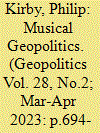

|
|
|
|
|
| Summary/Abstract |
This article explores the potential for the field of popular geopolitics of close attention to the form and structure of instrumental film music. Specifically, it analyses the film scores for Superman (1978) and Superman Returns (2006), showing how these, in conjunction with the films’ visual components, communicate a series of geopolitical logics and ideas about gender and nationhood. In so doing, this article extends existing concerns in popular geopolitics with music, principally lyrical popular music, contributing to a new research agenda that offers detailed readings of musical scores and notation, informed by semiotic perspectives. It advocates an interdisciplinary approach to the analysis of film music, drawing on research in the rich and expanding field of film music studies. It supplements the close reading of the scores here with an analysis of audience reviews.
|
|
|
|
|
|
|
|
|
|
|
|
|
|
|
|
| 13 |
ID:
189397
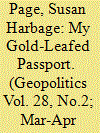

|
|
|
|
|
| Summary/Abstract |
This paper explores through visual arts the making of borders and nations and how they affect bodies and their mobility through the work of visual artist Susan Harbage Page. Harbage Page has created work about the U.S-Mexico Border since 2007 which explores why certain bodies are contested due to race, or status (refugee vs. illegal), and personal histories (culture/birthplace/social/marriage). This article examines how prescribed roles determine different levels of access to safety, work, and privilege. How social and political contexts of race, class, gender, and sex determine how an individual body experiences bordering practices. How a passport becomes one of the symbols agreed upon as a marker of belonging in a particular nation and only functions if it is respected and understood by other nations outside its boundary lines. It also explores the positionality and personal history of the researcher/artist and the role it plays in representation and the influence it has on visual research and artistic production. This article returns the discussion of borders back to embodiment and the roles that are projected onto bodies and then used to sift those bodies into differing terrains through bordering practices. It explores ways in which borders both serve to protect, exclude, and contain. This article is a first-person narrative that combines artistic practice with personal history to understand how situated knowledge impacts the production of artwork addressing social justice issues.
|
|
|
|
|
|
|
|
|
|
|
|
|
|
|
|
| 14 |
ID:
189383


|
|
|
|
|
| Summary/Abstract |
Drawing from Giorgio Agamben’s conceptualisation of the werewolf as a more-than-human figure, this article investigates how this figure may help in analysing the ‘animalisation’ of the refugees banned to the forest along the so-called Balkan Route. After briefly discussing how the werewolf has historically been a recurrent motif in European folkloric accounts and popular narratives depicting the stranger and the abnormal, the article examines how the werewolf has been presented by Agamben as a key figure in his conceptualisation of the sovereign ban. The article then proposed a reading of the Balkan Route and its informal refugee mobilities focussed on their unruly spatialities, made of makeshift camps but also forests and bushes converted into temporarily inhabited ‘jungles’ by banned individuals-on-the-move. The final section illustrates the violence at the border by engaging with Rita Sakr’s analysis of two shorts stories written by Iraqi former refugee Hassan Blasim and based on a more-than-human refugee journey across the Balkan Route. The article concludes by suggesting that the figure of the werewolf-refugee may help in understanding the condition of refugees along the Balkan Route and the violence they are exposed to during their more-than-human journeys across this corner of Europe.
|
|
|
|
|
|
|
|
|
|
|
|
|
|
|
|
| 15 |
ID:
189395


|
|
|
|
|
| Summary/Abstract |
Scholarly study of the popular geopolitics of boardgames has lagged behind that of other ludic artefacts, such as toys and videogames. This article examines the boardgame Twilight Struggle as a premiere example of a historically-structured boardgame (HSBG). HSBGs are distinct for their tight and intentional integration of narrative, gameplay, and in-game freedoms consistent with historical events, processes, and actors. Although not requiring players to follow a pre-set script, HSBGs are structured so that their available options, incentives, and victory conditions ensure that players act in a historically accurate manner. The effect is that players re-enact or perform a version of this history, even if they are unfamiliar with it. By focusing on what HSBGs make players do, rather than the representations embedded within them, this study contributes to our understanding of the performative agency of popular geopolitical objects.
|
|
|
|
|
|
|
|
|
|
|
|
|
|
|
|
| 16 |
ID:
189396


|
|
|
|
|
| Summary/Abstract |
Using the approaches of critical geopolitics, the authors compare Russian official, expert and media discourses on Russian-Chinese relations and China including such issues as its domestic and foreign policies, its role in the world, economic development and military potential. To study the official political discourse, more than 300 official documents were collected, including speeches, presentations and interviews by Russian leaders from 2012 to 2019. The screening of the Vesti news programme at the “Russia-1” state federal TV channel served a basis for the media discourse analysis. A scrutiny of about 2,900 articles on China and Russian-Chinese relations found in course of screening of 2012–2019 issues of the Nezavisimaya Gazeta, a daily federal “intellectual” newspaper destined to highly educated audience that pays much attention to foreign policy, was selected as a source of information on the expert discourse. The authors conclude that there is a clear gap between the official and expert discourse on China. While most of the participants agree that there is no alternative to a partnership with the great eastern neighbour, many experts express their concerns about the growing asymmetry in the two countries’ potential. This difference arises from the lack of confidence at the grassroots level as well as from the fact that some Russian partners seek to excuse their failures by blaming them on China’s unwillingness to compromise. In conclusion the authors consider the influence that different discourses have on Russian public opinion using the results of national surveys and focus groups. They show that part of the elite itself, accustomed to certain doubts about the possibility of strategic cooperation with China, reproduces a sceptical attitude towards the Chinese partners.
|
|
|
|
|
|
|
|
|
|
|
|
|
|
|
|
| 17 |
ID:
189384


|
|
|
|
|
| Summary/Abstract |
More-than-human approaches to borders unsettle the anthropocentric reading of borders and bordering practices. They call for radically different imaginings of shared vulnerabilities and co-existence on the border. What remains marginal in these discussions is the way in which more-than-human borders continue to neglect social differences and unequal power relations among different (human) individuals. The question is not simply about the hierarchy between human and non-human lives, but how the construction of such binaries continues to privilege the life of certain humans while exposing their pervasive violence on others. Using the case of the development of Trans Frontier Conservation Areas (TFCAs) in southern Africa, we argue that limiting the voice of the human in our readings of the border to create space for non-humans could draw attention away from significant political analysis of mobility privileges and practices of ongoing colonisation in the construction of more-than-human spaces. By drawing on Henri Bergson’s political philosophy of becoming and of open and closed societies, we suggest that more-than-human borders can be re-thought in terms of Bergson’s reading of movement, qualitative multiplicity, and open societies – a language that resists any forms of closure and a linear understanding of progress and time. A close examination of TFCAs suggests that practices that seek to enable connectivity and mobility across time and space can turn borders into spatio-temporal chokepoints, which preserve the familiar logics of colonisation and exclusionary bordering.
|
|
|
|
|
|
|
|
|
|
|
|
|
|
|
|
| 18 |
ID:
189391
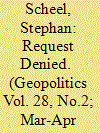

|
|
|
|
|
| Summary/Abstract |
Digital information and identification technologies offer state authorities new means for rendering individual subjects and entire population legible. Based on fieldwork at a migrant reception centre in Berlin, this article investigates how migrants hitherto unknown to authorities are translated into re-identifiable, governable subjects with the help of various digital devices. Conceptually, the article complements a sociology of translation with a vocabulary of treason to better account for coercion, force and violence as well as instances of resistance, friction and break-down in the assembling of related socio-technical networks. It shows that such an ANT-inspired framework, while facilitating a radically situated analysis, allows for exposing larger strategies of power. Through a detailed analysis of migrant registration procedures the paper develops three interrelated arguments on the digitisation of border and migration management: First, processes of digitisation are not reducible to the securitisation of migration. They are interrelated with the logistification of migration management which revolves around a logic of efficiency. The link between the digitisation and the logistification of migration management resides, secondly, in authorities’ attempts to establish migrants’ traceability. This is accomplished through the production of biometric identifiers and the allocation of personal identification numbers (PINs) which function as spokespersons for migrants. The fact that migrants often have to contest accounts shared by these informants in future encounters with authorities highlights, thirdly, that the production of legibility by digital means involves significant degrees of ontological violence.
|
|
|
|
|
|
|
|
|
|
|
|
|
|
|
|
| 19 |
ID:
189380


|
|
|
|
|
| Summary/Abstract |
This article argues that the storying of fossiliferous geological strata opens up geopolitical possibilities for climate justice and ethical energy futures. Our more-than-human approach to the fossil-fuel industry and more specifically coal trade is sparked by ongoing political controversies and protests that have erupted over the development of the Galilee coal Basin in central Queensland, Australia by Indian mining conglomerates. Through a focus on this case study, we first draw attention to toxic border thinking on development, fossil fuel energy futures and climate change enabled by state-corporate collusions. Second, we argue for opening up decolonial horizons by dwelling in the border – the border that alerts us to the distributed agency of geologic life and vitality of fossilised seed ferns. Thinking with deep time and geological strata we explore the geopolitics of ‘clean coal’ and limitless groundwater that justifies mining in the Galilee basin and the establishment of new thermal plants on Adivasi lands in India. Attention to the materiality of fly ash and its transformation into cement for construction in India, Bangladesh, Nepal, and Bhutan highlights more sustainable energy use, but we argue that this carbonised cement would also linger as a future fossil from the Anthropocene that refuses extinction. Finally, by thinking with the artwork Towards a Glass Monument (2017–2019) by Tom Nicholson and Geoffrey Wallace we encounter a method for shifting viewer perspectives on coal from its identity as a homogeneous fuel source to a delicate historical record of past flora. The article demonstrates that even when worlds inhabited by racialised and marginalised peoples are silenced, the materiality of coal, ash, water and the visual echo of fossiliferous plant spores seed more-than-human framings of justice. We position both our case study exploration and Towards a Glass Monument as examples of how to story strata with the aim of opening up geopolitical possibilities for more-than-human climate justice.
|
|
|
|
|
|
|
|
|
|
|
|
|
|
|
|
| 20 |
ID:
189388
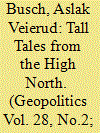

|
|
|
|
|
| Summary/Abstract |
The Arctic region is rapidly changing amidst accelerating climate change. This has led to a striking international consensus on the importance of safeguarding its environment and keeping the region conflict-free. Despite this face-value consensus, discussions on Arctic politics are often framed in competitive and contentious terms. Why do actors with seemingly common goals clash in heated debates? This article seeks to explain this discord by analysing whether actors have a shared understanding of what the region is and thus what they are trying to manage and safeguard. This article reveals, through discourse analysis of a large range of actor’s descriptive documents on the Arctic, that environmental issues predominate discourses of the Arctic, but that this consensus is undermined by diverging conceptions about what these environmental changes entail. Disagreements on the nature of the Arctic as a zone with economic potential or geostrategic relevance reveal that there is contestation in how actors conceive of the region. These contested discourses have already left their mark on Arctic cooperation structures, and need to be considered in both current and future efforts to manage the region.
|
|
|
|
|
|
|
|
|
|
|
|
|
|
|
|
|
|
|
|
|